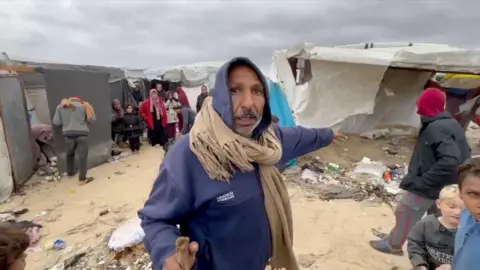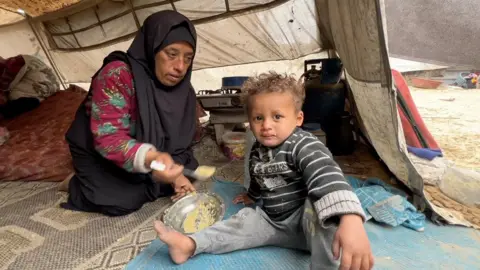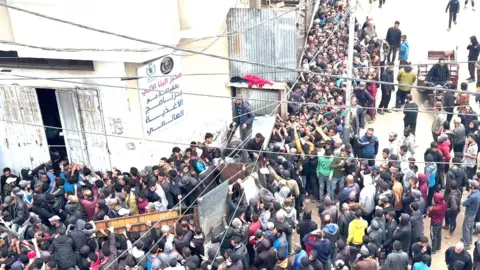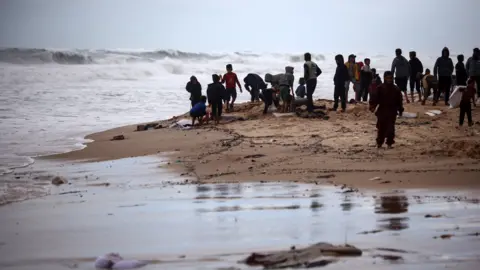Physical Address
304 North Cardinal St.
Dorchester Center, MA 02124
Physical Address
304 North Cardinal St.
Dorchester Center, MA 02124

 The BBC
The BBCGaza's beaches are no longer for day trips. Tens of thousands of people must now live on the coast, forced from their homes during the war.
In recent days, they have come under a new kind of assault: from wintry seas that batter their fragile makeshift dwellings.
“There is nothing left in the tent: neither mattresses, mats, bread, everything has been taken. The sea took him away,” said Mohammed al-Halabi in Deir al-Balah.
“We rescued a two-month-old child who was dragged out to sea.”
Almost all of Gaza's 2.3 million people have already been displaced, and nine out of ten of those living in shelters are in tents, the UN says.
With the sharp drop in temperatures, many people fall ill. There was flooding from stormwater and sewage.
“My children's feet, their heads – everything is freezing,” Shaima Issa told the BBC in Khan Younis. “My daughter has a fever due to a cold. We basically live on the street, surrounded by strips of fabric. Everyone here is sick and coughing.”
“When it rains on us, we are wet,” adds her neighbor Salwa Abu Nimer, crying. “The torrential rain is flooding us and we have no waterproof covering. Water seeps into the tent, we wear our clothes wet.
“No flour, no food, no drink, no shelter,” she continued. “What is this life that I live? I walk to the end of the world just to feed my children.”

Although the situation is worst in the north, UN officials have warned of dire shortages of medicine, food, shelter and fuel in Gaza, describing the situation as “catastrophic”.
There are long queues for charity donations in parts of central and southern Gaza, where most people live.
On consecutive days, our local cameramen have filmed hundreds of people crowding in front of bakeries where there is very little bread. Sometimes there are clashes as those waiting rush forward.
“I need a loaf of bread. I have pain, diabetes and high blood pressure. I can't push my way through crowds of people; I am afraid I will suffocate and die,” said Hanan al-Shamali, who is in Deir al-Balah but originally comes from northern Gaza.
“I need bread so I can feed the orphans I care for. I come here every morning. In the end, do I get bread or not? Sometimes I get it, but most of the time I don't.'

At the Kerem Shalom border crossing, Israel's main crossing point with Gaza, last week journalists were shown trucks carrying goods that had gone through security checks.
Aid entering the Palestinian territory remains at some of the lowest levels in a year. Israel blames aid agencies for the proliferation problems.
“Unfortunately, we still see that the biggest delay in humanitarian aid getting to where it needs to be is the distribution capabilities of international organizations, as evidenced by the 800 aid trucks around me,” said Shimon Friedman, a spokesman for Kogat , part of the Israeli army that controls the crossing points.
But inside Gaza, aid workers say armed gangs looted incoming supplies brought through Kerem Shalom amid increasing iniquity. This prompted the largest UN agency operating in the territory, Unrwa, to stop using this supply route.
The big picture, says Antoine Renard, local head of the UN's World Food Programme, is of Palestinians facing a “daily struggle for survival”.
“The levels of hunger, devastation and destruction we are seeing now in Gaza are worse than ever. People can no longer cope,” says Mr Renard. “Hardly food arrives while the markets are empty.”
Amidst the destruction in Gaza, the end of the war is still in sight. Just waiting for more suffering as cold weather sets in.
